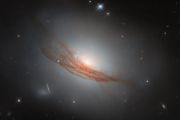
Copernical Team
Spacecraft can 'brake' in space using drag − advancing craft agility, space safety and planetary missions
This request seems a bit unusual, so we need to confirm that you're human. Please press and hold the button until it turns completely green. Thank you for your cooperation!
Press and hold the button
If you believe this is an error, please contact our support team.
185.132.36.159 : e5e71648-e40a-4618-a8ce-b08ba70c
Key portion of Nancy Grace Roman Space Telescope clears thermal vacuum test
This request seems a bit unusual, so we need to confirm that you're human. Please press and hold the button until it turns completely green. Thank you for your cooperation!
Press and hold the button
If you believe this is an error, please contact our support team.
185.132.36.159 : 3b027d65-8b7c-4633-bdf5-f76e5f28
Soviet-era spacecraft is expected to plummet to Earth this weekend after 53 years
This request seems a bit unusual, so we need to confirm that you're human. Please press and hold the button until it turns completely green. Thank you for your cooperation!
Press and hold the button
If you believe this is an error, please contact our support team.
185.132.36.159 : bb895919-a944-405c-8425-80cb342a
Soviet-era spacecraft plunges to Earth after 53 years stuck in orbit
This request seems a bit unusual, so we need to confirm that you're human. Please press and hold the button until it turns completely green. Thank you for your cooperation!
Press and hold the button
If you believe this is an error, please contact our support team.
185.132.36.159 : 1858e1d4-b2de-4dc4-9f7d-2cab3d7a
NASA's planned budget cuts could set back space science, but show how to future-proof the agency
This request seems a bit unusual, so we need to confirm that you're human. Please press and hold the button until it turns completely green. Thank you for your cooperation!
Press and hold the button
If you believe this is an error, please contact our support team.
185.132.36.159 : 82246a69-e178-4965-bb9e-60230f56
Space law doesn't protect historical sites, mining operations or moon bases—a lawyer describes a framework that could
This request seems a bit unusual, so we need to confirm that you're human. Please press and hold the button until it turns completely green. Thank you for your cooperation!
Press and hold the button
If you believe this is an error, please contact our support team.
185.132.36.159 : a1534e74-7da3-441e-87c0-03230b6b
Tough microbes found in NASA cleanrooms hold clues to space survival and biotech
This request seems a bit unusual, so we need to confirm that you're human. Please press and hold the button until it turns completely green. Thank you for your cooperation!
Press and hold the button
If you believe this is an error, please contact our support team.
185.132.36.159 : b732a63a-9a79-4c94-b065-05d9bf3d
Citizen science contributes to imaging Jupiter's turbulent atmosphere
This request seems a bit unusual, so we need to confirm that you're human. Please press and hold the button until it turns completely green. Thank you for your cooperation!
Press and hold the button
If you believe this is an error, please contact our support team.
185.132.36.159 : 6fede4f8-9cf9-4794-8e38-3f4f5998
Galileo satellite GSAT0104 retires after 12 years of navigation service
This request seems a bit unusual, so we need to confirm that you're human. Please press and hold the button until it turns completely green. Thank you for your cooperation!
Press and hold the button
If you believe this is an error, please contact our support team.
185.132.36.159 : 7ff76c99-b593-4205-9e0e-3cfdedc5
Artemis III core stage receives thermal protection coating
This request seems a bit unusual, so we need to confirm that you're human. Please press and hold the button until it turns completely green. Thank you for your cooperation!
Press and hold the button
If you believe this is an error, please contact our support team.
185.132.36.159 : 66f4f655-b453-4768-ae17-310fb3c7
































